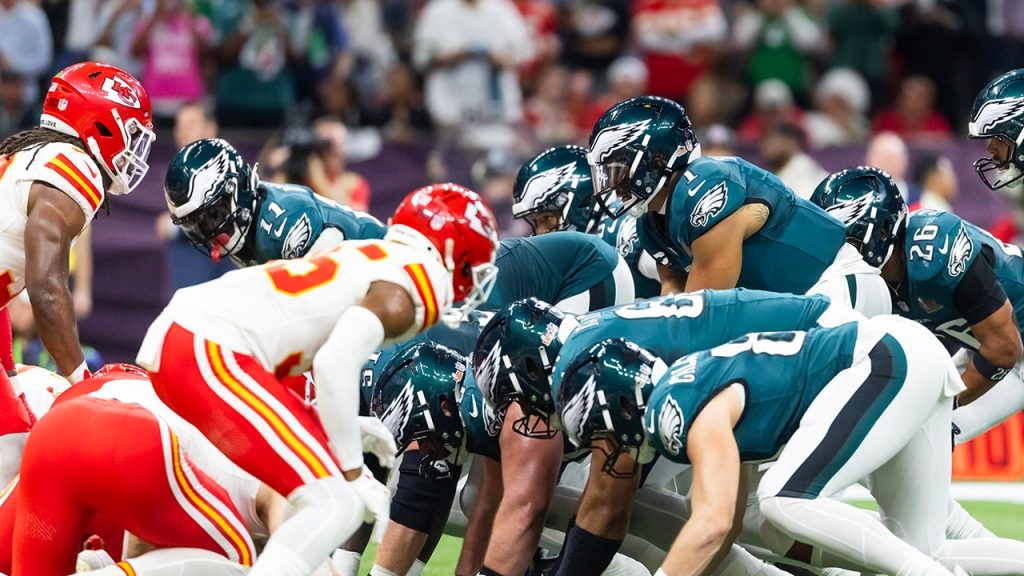The Unstoppable “Tush Push”: How the Eagles’ Controversial Play Call Survived NFL Scrutiny
The Philadelphia Eagles’ controversial “tush push” play has once again become the center of heated debate following their 20-17 victory over the Kansas City Chiefs on Sunday. This quarterback sneak variation, which involves Jalen Hurts being pushed from behind by his teammates, narrowly survived an offseason vote by NFL owners who considered banning it entirely. The play’s continued existence proved crucial in Sunday’s matchup, with Hurts scoring a pivotal fourth-quarter touchdown using the maneuver that gave Philadelphia the cushion needed to secure their win.
What makes the tush push particularly contentious isn’t just its effectiveness but the questions surrounding how it’s officiated. During Sunday’s game, eagle-eyed fans noticed potential infractions that went uncalled—Eagles offensive linemen appeared to be moving before the snap, and there were questions about the center’s positioning over the ball before it reached Hurts. These observations have fueled criticism that the play exists in a gray area where traditional rules enforcement seems inconsistent. ESPN’s Adam Schefter didn’t mince words on Monday’s “Get Up” program, declaring that “This game was lost in March. This game was lost when the NFL owners refused to ban the tush push from happening.” He went further, suggesting officials themselves seem uncertain how to regulate the play, noting, “You’re seeing the Eagles’ linemen jump offside every play and nothing’s called.”
The controversy highlights a fascinating intersection of strategy, rules, and tradition in professional football. Philadelphia has perfected this short-yardage technique over several seasons, turning it into a nearly unstoppable weapon when needing just a yard or two. While technically legal under current rules, the tush push challenges traditional notions of what constitutes a fair advantage in football. The Eagles have essentially created a play that exploits a loophole in the rulebook—one that combines leverage, timing, and coordinated team effort in a way that defenses have yet to solve. It’s reminiscent of other innovative tactics throughout NFL history that initially faced resistance before either being accepted or legislated against.
Statistics underscore the impact of this controversial play on game outcomes. In Sunday’s matchup, the Eagles converted 5 of 14 third downs and were perfect on their single fourth-down attempt—situations where the tush push often comes into play. Over multiple seasons, Philadelphia’s success rate with this play has been remarkably high, approaching near-certainty in many short-yardage situations. This consistency gives the Eagles a unique competitive advantage that other teams have struggled to neutralize or replicate with the same effectiveness. The psychological impact cannot be understated either—defenses know what’s coming but seem powerless to stop it, creating a demoralizing effect that extends beyond just the points on the scoreboard.
The debate extends beyond mere gameplay strategy to questions about the spirit of competition and the evolution of the sport. Some traditionalists argue that the play violates the intended nature of the quarterback sneak, turning what was once a test of individual effort and timing into something more akin to a rugby scrum. Others view it as simply the latest example of innovative coaching in a sport that constantly evolves. The NFL’s competition committee will likely revisit this issue in future meetings, weighing factors like player safety, competitive balance, and the entertainment value that such distinctive plays bring to the game. The Eagles, meanwhile, will continue to employ their signature strategy until rules explicitly forbid it.
As the season progresses, the tush push will remain under intense scrutiny from officials, analysts, and fans alike. Every execution of the play will be dissected for potential infractions, and opposing teams will continue seeking countermeasures to the seemingly unstoppable tactic. For Philadelphia, this controversial play represents more than just a reliable way to gain short yardage—it has become part of their identity, a symbol of their willingness to push boundaries both literally and figuratively. Whether the tush push eventually faces stricter regulation or becomes an accepted part of football’s strategic landscape remains to be seen, but its impact on the current NFL season—and particularly on games involving the Eagles—is undeniable.


